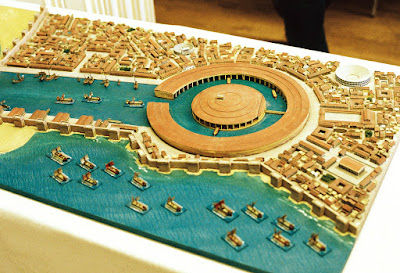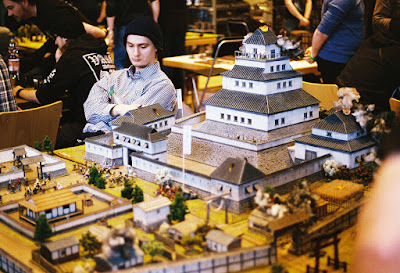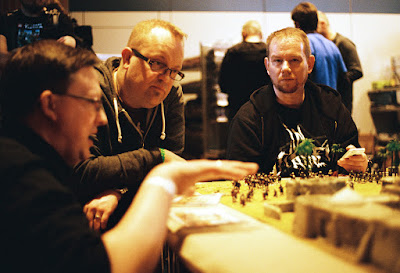I like talking to a friend, my son calls Kügel, because he can’t pronounce his name well. He is a long-term philosophy student, gamer and avid reader of cheap fantasy novels. Today I talk to Kügel about “Evocation vs Imitation vs Emulation in adapting literary source material to RPGs“, my topic for the first round of the Thought Eater essay contest.
We have some difficulties defining the three terms, maybe because English isn’t our native language, maybe because we are not that smart. “To emulate“ seems to have two meanings.
1. imitate with effort to equal or surpass
If this essay is supposed to find out which of the three forms of adaptation is the best, emulation automatically beats imitation. Per definitionem, says Kügel.
2. The other meaning of “emulate“ is more interesting. A program can be emulated on a computer, it wasn’t originally written for. What the original program and the new program do looks very similar to the user, but the programs are actually different. Emulation in this sense works best when a text is adapted from one system to a similar system. The fairy tale “Hänsel und Gretel“ can be translated from German to English, for example. German and English are both languages. But can the story be emulated as a film? Or as an RPG?
At first, we understand the difference between evocation and imitation, but talking about it for a while, we get lost. To imitate means to copy superficial elements, all the details of a text. To evoke means to create a similar atmosphere, to write in a similar style, to copy essential elements only, like the more important parts of the plot or the structure.
“The Texas Chainsaw Massacre“ is a clever adaptation of “Hänsel und Gretel“. You have a group of young people getting lost in the wilderness. You don’t have two children abandoned by their parents. You have cannibalism, but no witch. You have an isolated house, but it’s not decorated with ginger bread. Both stories create a scary atmosphere.
Thinking a bit more about evocation, imitation and emulation, the lines get more blurry. Most texts which “evoke“ other texts also copy some superficial elements and emulation just seems to be a more accurate or better form of imitation, depending on how you define it. Kügel says the topic is unclear, because the terms we deal with are too similar. “And what is literary source material anyway?“, he adds. “The plot? The characters? The style of writing? The world the story creates?“
I propose to work with this: Playing an RPG, you can refer to a text in different ways. One extreme way is trying to imitate as many elements of the text as closely as possible. MERP springs to my mind. The other extreme way is to refer loosely to the text, in an abstract way, and only copy elements you find essential. “A Red & Pleasant Land“ does this. You could call both forms of adaptation “imitation“, the first one “emulation“, the second one “evocation“.
Kügel says: “Your essay will be disqualified. Let’s think about this in a different way. Try to be original. What works best for a GM?“ Kügel doesn’t like to work if he can avoid it. He says: “Which way needs less preparation?“
Well, if you are good at seeing the structure of a text, picking up elements that interest you, changing them, combining them with other elements and filling the gaps, a concept like “evocation“ works for you. If you are good at memorizing lots of information and reproducing it, a concept like “emulation“ works for you.
Kügel says: “Remember. ‘Opinions differ round-up‘, and ‘Well it’s a balance‘-style essays will be disqualified.“
Ok. Here’s another, more personal way to look at it. As an experiment, I wouldn’t mind adapting “Hänsel und Gretel“ as an RPG and stick to the original as closely as possible. Of course, the first thing that would get lost in the process is the plot of the fairy tale and with the plot a lot of other elements would transform. Being an improvisational effort of a group of people, RPGs open up texts anyway. Because of this, one could argue, when adapting a text, a concept like “evocation“ works best with Role Playing Games. It gives enough space to improvise.
But there is something else. I usually don’t feel too comfortable with people who stick to all the details of a given game world and obsess about it. I live in Germany, a country populated by square headed people.
“You said, we were playing ‘Hänsel und Gretel‘, so why did we encounter a wolf on the way through the forest? This is not ‘Little Red Riding Hood‘, is it?“
“It was just a wolf, an animal. It didn’t say anything. It ran away.“
“Why do we keep finding little bones and wooden objects where we left the breadcrumbs? Where is the gingerbread house? And why did Hänsel just disappear? That wasn’t supposed to happen. Where is the witch? I don’t like this.“
Tuesday, 21 June 2016
Tuesday, 7 June 2016
Hamburg Tactica 2016 / Part Three
Here are my impressions about the Tactica 2016. Please check out the first and the second part of my text about the excellent wargaming convention in Hamburg as well.
On Sunday we had one more game, starting at 2 PM. In the morning I went around taking pictures. While I took a picture of a model of an arcane port, a young man started to talk to me. "Is this a 35 mm camera? A Leica?" "Yes", I said. "That’s cool." Jörg, who was standing next to me, said: "Yes. But it’s not a Leica M4. The M4 is really valuable. This one isn’t." I said: "It’s my father’s old camera. It’s valuable to me. My father died a long time ago. He loved to take pictures with this camera." The young man said: "It’s cool that you take pictures with your old 35 mm camera." "You could get one on Ebay. It’s not expensive.", I said. "The M4 is really expensive.", Jörg said. The young man said: "I wouldn’t know what to do with it." "It’s not difficult. Just try it.", I said. "No thanks. That’s a hobby on its own."
Krüger and I went to the Foundry booth. I bought the "Foundry Miniatures Compendium". Krüger bought eight warrior women from their Darkest Africa range to use in our Waltrop campaign.
In the afternoon we played a game presented by the German club THS. "Skirmish at Disuq - Egypt 1801." The scenario was designed by the fantasy author and wargamer Bernhard Hennen, using a variant of the ruleset Lion Rampant, published in the April issue of Wargames Illustrated. This is the introduction to the scenario, in Bernhard Hennen’s words:
"It’s spring of 1801. Napoleon has left Egypt a long time ago. British troops have landed successfully and are marching on Cairo.
First skirmishes are taking place near Rahmanieh on the left bank of the Nile between the British expeditionary force, supported by Ottoman troops. In a coup-de-main the French occupy the small town of Disuq on the opposite river bank. The British react swiftly and strongly. With a tenfold superiority they attack the French. But what is the real objective of this fight off the main battle site? This skirmish scenario will give an adventurous answer."
Our game master Sunday afternoon was Stefan. Jörg played the British, Teemu from Finland played their Ottoman allies, Krüger played the French soldiers defending the town of Disqus and I played some French treasure hunters. The table was very beautiful, the atmosphere of the game playful and relaxed. Thanks, THS. There is a post with more pictures on the blog Monty’s Caravan. Check it out!
In the train, on our way back to Berlin, Krüger and I talked about fantasy literature and how the internet changes how it is published. After 30 minutes a woman said to Krüger: "Shut up! You bother me. You talk like children."
Well, this, of course, leads to the question what is an adult which I might discuss in another blog post.
On Sunday we had one more game, starting at 2 PM. In the morning I went around taking pictures. While I took a picture of a model of an arcane port, a young man started to talk to me. "Is this a 35 mm camera? A Leica?" "Yes", I said. "That’s cool." Jörg, who was standing next to me, said: "Yes. But it’s not a Leica M4. The M4 is really valuable. This one isn’t." I said: "It’s my father’s old camera. It’s valuable to me. My father died a long time ago. He loved to take pictures with this camera." The young man said: "It’s cool that you take pictures with your old 35 mm camera." "You could get one on Ebay. It’s not expensive.", I said. "The M4 is really expensive.", Jörg said. The young man said: "I wouldn’t know what to do with it." "It’s not difficult. Just try it.", I said. "No thanks. That’s a hobby on its own."
Krüger and I went to the Foundry booth. I bought the "Foundry Miniatures Compendium". Krüger bought eight warrior women from their Darkest Africa range to use in our Waltrop campaign.
In the afternoon we played a game presented by the German club THS. "Skirmish at Disuq - Egypt 1801." The scenario was designed by the fantasy author and wargamer Bernhard Hennen, using a variant of the ruleset Lion Rampant, published in the April issue of Wargames Illustrated. This is the introduction to the scenario, in Bernhard Hennen’s words:
"It’s spring of 1801. Napoleon has left Egypt a long time ago. British troops have landed successfully and are marching on Cairo.
First skirmishes are taking place near Rahmanieh on the left bank of the Nile between the British expeditionary force, supported by Ottoman troops. In a coup-de-main the French occupy the small town of Disuq on the opposite river bank. The British react swiftly and strongly. With a tenfold superiority they attack the French. But what is the real objective of this fight off the main battle site? This skirmish scenario will give an adventurous answer."
Our game master Sunday afternoon was Stefan. Jörg played the British, Teemu from Finland played their Ottoman allies, Krüger played the French soldiers defending the town of Disqus and I played some French treasure hunters. The table was very beautiful, the atmosphere of the game playful and relaxed. Thanks, THS. There is a post with more pictures on the blog Monty’s Caravan. Check it out!
In the train, on our way back to Berlin, Krüger and I talked about fantasy literature and how the internet changes how it is published. After 30 minutes a woman said to Krüger: "Shut up! You bother me. You talk like children."
Well, this, of course, leads to the question what is an adult which I might discuss in another blog post.
Labels:
gaming conventions,
Jörg,
Krüger,
on the road,
photography,
Tactica
Subscribe to:
Posts (Atom)






